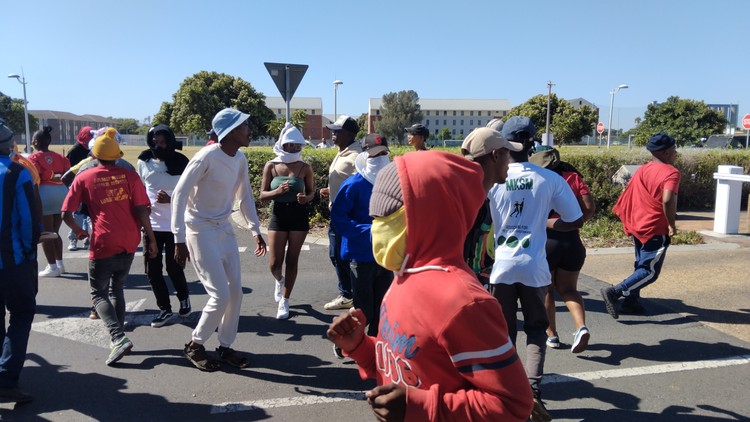
11 February 2025
More than a hundred students protested outside the gates of the University of the Western Cape on Monday afternoon. Photo: Sandiso Phaliso.
Students at universities across the country protested and disrupted classes on Monday amidst an ongoing student housing crisis.
Universities are unable to provide enough housing for all students in need. Students relying on NSFAS funding for private accommodation are battling a dysfunctional online accommodation platform and there are reportedly not enough NSFAS-approved accommodation facilities to meet the demand.
Some students report that private accommodation owners are demanding deposits or rental top-ups which are not allowed by NSFAS.
At the University of the Western Cape (UWC), hundreds of students have been sleeping in the university’s student centre. “We are forced to occupy overcrowded, unsafe, and precarious living conditions,” said first year student Athini Mvelase who travelled from the Eastern Cape and has been living in the university’s student centre for the past two weeks.
On Monday, more than a hundred students protested outside the university’s entrance. Students threw stones at the gates and rubber bullets were shot at the students by a private security company.
UWC spokesperson Gasant Abarder told GroundUp that at least one student was injured during the protests. Abarder said that all university-owned accommodation has been fully allocated. This is despite the university having secured an additional 1,180 beds this year.
“We are exhausting all avenues at hand. This includes approaching private accommodation providers with requests to subsidise [beds] for students who do not have funding for accommodation,” said Abarder.
Equal Education Tertiary Society (EETS), an activist organisation, released a statement on Monday arguing that UWC must do more to resolve the crisis. It said that the university’s claims that additional beds have been acquired “is not only inaccurate but directly contradicts the reality students face on the ground”.
Cassinga Residence, owned by UWC, has been closed for renovations and according to EETS, students are being “moved around with no clear strategy, creating havoc”. EETS also warned that private landlords are exploiting desperate students, forcing them to pay “exorbitant fees”.
EETS called on academic classes to be postponed, Cassinga Residence to be reopened, and for the university to provide a “transparent and structured” housing plan.
The Cape Peninsula University of Technology also cancelled classes and orientation sessions for first year students on Monday. Hundreds of students have been sleeping in common areas. Protesting students were disbursed by police stun grenades and water cannons on Monday afternoon, eyewitnesses confirmed.
At Nelson Mandela University (NMU) in Gqeberha, entrances to the campus were blocked with burning tyres on Monday morning. There was no protest action on Tuesday but classes had been moved online. All shuttle services were also suspended.
NMU students we spoke to said they had not received NSFAS allowances yet despite having been approved for funding. Since mid-2024, after the NSFAS payment system failed, allowances are paid to students by universities. NMU confirmed on Monday that 14,000 allowances had been paid and the remaining 3,200 allowances would be paid within 72 hours.
Some NMU students who have been allocated NSFAS-accredited accommodation say conditions are terrible. They are positioned next to a busy nightclub in the city centre and have only cold water.
There have also been reports of student protests in KwaZulu-Natal and the Free State.
Humanitarian organisation Gift of the Givers is assisting students at several campuses in the Western Cape, including CPUT and UWC, with blankets and hot meals. Ali Sablay of Gift of the Givers, said a “humanitarian crisis is brewing.”
“We have received many calls requesting assistance from students, parents, and human rights groups, as the students do not have access to food and water,” said Sablay.
Students at Cape Peninsula University of Technology have been sleeping in common areas, unable to find accommodation. Archive photo: Ashraf Hendricks.
The Organisation Undoing Tax Abuse (OUTA) has raised concerns about NSFAS’s management of student accommodation, saying in a statement last month that NSFAS is “sitting on a student accommodation time bomb”.
In 2023, then Higher Education and Training Minister Blade Nzimande reduced accommodation allowance caps from R60,000 to R45,000 per student per year.
Last year, NSFAS launched a new accommodation platform on which landlords register their available housing and become accredited. Students seek accommodation on that platform and landlords are paid directly by NSFAS. But the platform is dysfunctional and NSFAS-appointed accreditation officers appear to be inexperienced and lack the necessary skills, according to OUTA.
OUTA and others have highlighted corruption and irregularities in NSFAS’s student accommodation tenders. Last year, NSFAS was placed under administration and its CEO Andile Nongogo has been dismissed in light of corruption allegations.
NSFAS also owes members of the Private Student Housing Association (PHSA), R44-million in outstanding rental fees for 2024. The PHSA’s members provide 80,000 student beds nationwide.
“The operational issues with the accommodation portal remain unresolved. Accreditation and grading processes are a mess, and NSFAS has failed to pay landlords for accommodation provided in 2024, leaving them in financial distress,” said OUTA’s Rudie Heyneke.
OUTA believes accommodation should be administered by the universities and TVET colleges, not NSFAS.
NSFAS and the Department of Higher Education and Training did not respond to our questions by the time of publication.